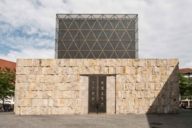
The Ohel Jakob Synagogue is an architectural masterpiece. Along with the Jüdisches Museum (Jewish Museum) and the Gemeindezentrum (Community Centre), it forms part of the Jüdisches Zentrum (Jewish Centre) at Sankt-Jakobs-Platz in Munich.
The new Ohel Jakob Synagogue (from the Hebrew for “Jacob’s Tent”) was officially inaugurated at the Jüdisches Zentrum in November 2006. It meant that, finally, Munich’s Jewish community had a main synagogue once again following the destruction during 1938’s Pogromnacht (also known as Kristallnacht, the Night of Broken Glass) of the former Ohel Jakob Synagogue in Herzog-Rudolf-Straße (near Maximilianstraße). Munich’s Jewish community defines itself as orthodox, and is the second largest in Germany, numbering some 9,500 adherents.
The synagogue consists of two cubes, one on top of the other: The mighty stone base is intended to resemble the Wailing Wall in Jerusalem. Atop it sits a glass cube featuring interlaced Stars of David, encased in a bronze metal veil. The glass structure represents a tent, symbolising the 40 years the Jews spent wandering the Sinai desert. On the portal of the synagogue are the first ten letters of the Hebrew alphabet, which are reminiscent of the Ten Commandments.
The synagogue has over 550 seats. Visitors can access the interior of the building via the underground “Gang der Erinnerung” (“Corridor of Memory”), which connects the synagogue with the community centre. The walls of the 32-metre passage bear the names of 4,500 Munich Jews who were murdered under the Nazi regime.
The Israelitische Kultusgemeinde München und Oberbayern (Jewish Community of Munich and Upper Bavaria) organises regular tours of the synagogue in German, English, French, Italian, Russian and Hebrew. For organisational reasons, visitors must book tours at least ten days in advance. Phone +49 89 20 24 00 100, email: anmeldung@ikg-m.de.
Become curious? Discover the Jewish life in Munich with a guide of the city of Munich or be inspired by the modern buildings in the city center.